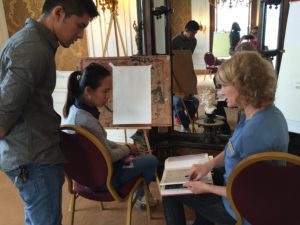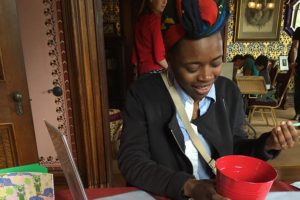Program Description
The Lippitt Lab program, which takes place once a month May through December, explores distinctive aspects of 19th century and Victorian culture in Providence, RI, and in the United States as a whole. The program runs for two hours and gives families an opportunity to rotate through stations and interact with docents or first-person interpreters at their own pace. Topics include childhood and play, politics and elections, and holidays. Lippitt Labs are designed to be multi-user so that each member of a family is engaged with the content and activity. Docents layer the information in multiple modes so that it is accessible and appropriate for each visitor. Docents weave in authentic primary sources and artifacts with engaging activities for adults and kids to work on together. There is a focus on looking at historical objects together to learn the stories of the past, and at the house itself to gain insights into the Lippitt family and their domestic servants. Docents ask guiding questions to promote close looking and encourage conversation. They also provide further information to those who seek deeper historical content. To make the history relevant to kids’ lives, docents try to make contemporary comparisons.
Program Environment
Activities are distributed across several rooms of the historic house with a docent on hand to explain the activity, provide historical context, and offer demonstrations. To make the environment accessible to multiple users, tables and chairs are set up so that all ages can be comfortable. The hands-on activities vary from month to month, but all have a focus on promoting conversation, looking closely, asking questions, making connections, and encouraging multi-generational interactions.

Other Family Programs
After running the program for a few months, staff realized that not all visitors who came during the drop-in time had children or wanted to do the activities. The staff decided to create an accompanying self-guided tour as an alternative. Museum staff have also created a family guide which includes drawing and writing activities and provides an opportunity for more self-directed exploration into the house and history.
Special thanks to Jaclyn Delamatre, Curator of Education at the Lippitt House Museum. http://www.preserveri.org/

